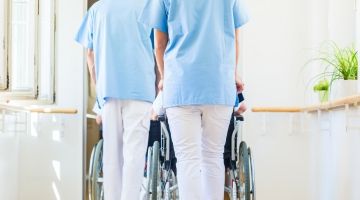Return to work, accommodation and support
IWH has a long history of conducting research on practices, policies and processes that help workers sustainably return to work after an illness or an injury. This page pulls together IWH research and resources on employer supports, job accommodations and modifications, as well as other related issues such as disclosure of disability.
Featured

Research Highlights
How do employment support programs impact the health of young adults with episodic disabilities?
Episodic disabilities can make it challenging for workers to find and sustain employment while managing their symptoms and work demands. An IWH study investigated the health impacts of employment support programs for young adults with episodic disabilities.
Published: April 8, 2024

Research Highlights
Workers are using cannabis to treat work-related conditions, mostly without medical guidance
While cannabis is often used recreationally, there is growing interest in its use for therapeutic purposes, such as for pain, anxiety, depression and sleep problems. Some workers are using cannabis many months following the onset of a work-related condition, mostly without medical guidance.
Published: October 5, 2023

At Work article
Key differences found in return-to-work process for MSD and psychological claims
Research comparing MSD and mental health compensation claims in Australia offers a picture of return-to-work challenges for psychological conditions.
Published: August 2016

At Work article
Monitoring progress key in implementing return-to-work program: IWH study
A workplace study of an innovative return-to-work program highlights progress and opportunities for improvement.
Published: April 2016

IWH in the media
Study looks at relationship between employers and doctors in return to work
A key element of a successful return to work is a good, communicative relationship among the injured worker, the employer and the worker’s doctors. But a study found the relationship between employers and doctors can be marred by mistrust and lack of communication.
Published: OHS Insider, April 2016

At Work article
New review finds motor control exercise reduces low-back pain, disability among sufferers
Published: February 2016

At Work article
Depressive symptoms common in first 12 months after work injury
A follow-up study by the Institute for Work & Health finds depressive symptoms at six months after work-related injury are a signal that poor mental health may persist at 12 months.
Published: February 2016
Project
Project
Effectiveness of workplace-based return-to-work programs: a systematic review update
IN 2004, IWH conducted its first systematic review of the literature on the effectiveness of workplace-based interventions, which in turn led to the popular Seven ‘Principles’ of Effective Return to Work. The Institute updated this review to see what new evidence may be available on workplace-based interventions.
Status: Completed 2017
IWH Speaker Series
IWH Speaker Series
Systematic review of the quantitative literature on RTW interventions
In 2004, the Institute for Work & Health (IWH) published a mixed-method systematic review on workplace‐based return‐to‐work (RTW) interventions. Recently, IWH and the Institute for Safety, Compensation and Recovery Research (ISCRR) in Australia worked together to update and expand this review to include system-level or jurisdictional interventions and mental illness. In this plenary, IWH's Emma Irvin and Kim Cullen discuss the latest findings and what they mean to the practice of evidence-based return to work.
Published: March 2015
Project
Project
Role of health-care providers in the workers’ compensation system and return-to-work process
How do health-care providers their role in the return-to-work process? What challenges do they face interacting with workers’ compensation boards, injured workers, employers and other health-care professionals? These are among the questions answered by a multi-jurisdictional research team led by IWH.
Status: Completed 2017
Project
Project
Developing an evidence base on sex/gender differences in the relationship between working conditions and injury risk, chronic illnesses and return to work
Are there important male and female differences in the assessment of work stress, the biological and behavioural reactions to work stress, and the relationship between work stress and risk of subsequent disease? This IWH study expects to find out.
Status: Completed 2018
Project
Project
Understanding employment transitions among people living with arthritis across the life course
Taking a life-course approach, an IWH research team explored the unique employment-related experiences and needs of people living with arthritis at different stages of their lives and careers.
Status: Completed 2017